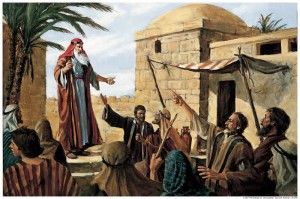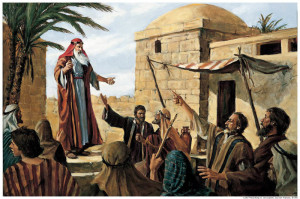People familiar with the Book of Mormon usually refer to the story of the broken bow as Nephi’s story, because he was the hero of it all. You can read the entire story summarized in Nephi and the Broken Bow.
As you read the story, note that although it’s told by Nephi from his own point of view, there are many other people in the story, and each of them have their own story-within-the-story. For Nephi, it is a story of solving problems. For Laman and Lemuel, it is a story of murmuring—again. For Lehi, however, it was a story of learning humility.
 Lehi was a great prophet. He was called from a life of privilege to warn the people of Jerusalem to repent. He accepted this call from God and risked, and eventually sacrificed, everything to carry it out. When the preaching was done, his life was in danger, and God was instructing him to leave behind his home and possessions and head for a yet unknown destination.
Lehi was a great prophet. He was called from a life of privilege to warn the people of Jerusalem to repent. He accepted this call from God and risked, and eventually sacrificed, everything to carry it out. When the preaching was done, his life was in danger, and God was instructing him to leave behind his home and possessions and head for a yet unknown destination.
Through all of this, Lehi never complained or lost faith. He didn’t complain when asked to give up a comfortable life to try to reform people who didn’t want reforming. He didn’t complain when they didn’t listen. He didn’t complain or lose faith when they tried to kill him. Even having to leave his entire lifestyle behind didn’t cause him to complain or to lose faith. He kept right on doing whatever God asked of him, however hard it might be.
But now, for the first time, Lehi struggled. His family was facing starvation. Nephi, the skilled hunter, broke his bow. They were unable to obtain food and there was certainly nowhere to go buy food or a new bow. For the first time ever, Lehi found himself complaining at and about God.
Only his teenaged son Nephi refused to lose faith. Nephi trusted God and set out to do what needed to be done. But first, he went to work trying to restore the faith of his family.
We learn a great deal about Lehi from his reaction to this event. Although Nephi spoke only to his brothers about what the proper attitude should be, clearly Lehi heard or was aware of what was happening. He didn’t get angry at Nephi for refusing to despair with the others. This is probably remarkable. We’ve all seen that people have a tendency to resent positive people when they are feeling discouraged. Lehi, however, didn’t get upset. It’s likely he paid attention and allowed Nephi’s words to soften his own heart,which prepared him for what came next.
Nephi, who had gone on to make a new, simpler bow and arrows, came to his father. Ignoring Lehi’s temporary lapse of faith, Nephi sought his father’s advice in deciding where to hunt with the new equipment. Lehi, probably feeling a bit embarrassed, went to God to ask what to do.
25 And it came to pass that the voice of the Lord came unto my father; and he was truly chastened because of his murmuring against the Lord, insomuch that he was brought down into the depths of sorrow.–1 Nephi 16
Nephi is telling the story and so, doesn’t discuss, if he even knew, what process his father had to go through to repent and to put his faith back in order. What is clear, however, is that Lehi was willing to learn from any worthy source, even a young adult son. We also see that he was not willing to allow a brief moment of weakness destroy a lifetime of faith. When given the opportunity to return to leadership by Nephi, he accepted and humbly asked the Lord for help in solving the family emergency.
Lehi serves as a model for humility in life, parenting, and leadership.
The late Terrie Lynn Bittner—beloved wife, mother, grandmother, and friend—was the author of two homeschooling books and numerous articles, including several that appeared in Latter-day Saint magazines. She became a member of the Church at the age of 17 and began sharing her faith online in 1992.


